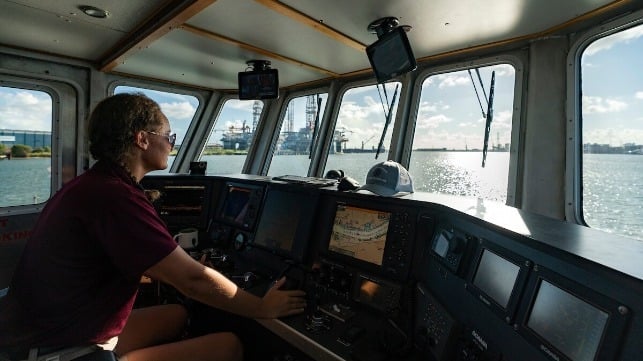Shaping The Future Of The Nation’s Blue Economy

[By: Texas A&M University]
With its 367 miles of coastline and a quarter of the state’s population calling the Gulf Coast home, growing the “blue economy” is of utmost importance to Texas.
As defined by the National Oceanic and Atmospheric Administration (NOAA), the blue economy looks to the ocean “not just for the extraction of material goods, but for data and information to address societal challenges and inspire their solutions.” Leveraging ocean resources to create jobs and drive sustainable economic development — while at the same time protecting marine and coastal ecosystems and environments — is central to the mission of Texas A&M’s newest academic college.
The new College of Marine Sciences and Maritime Studies, which launched in August, will lead the nation in innovation, research and education for the blue economy. The college, located at Texas A&M’s Galveston campus, is surrounded by the natural laboratories of the Gulf Coast and Texas’ marine, coastal and maritime industries, offering unparalleled hands-on water and coastal learning experiences.
“The College of Marine Sciences and Maritime Studies was created to improve lives and livelihoods through education, discovery, service and innovation in the blue economy,” said the college’s founding dean, Dr. Debbie Thomas. “Our college positions Texas A&M University to be the nation’s premier destination of choice for learners, scholars and professionals in the coastal, marine and maritime disciplines.”
The college boasts the nation’s most comprehensive collection of coastal, marine and maritime disciplines, offering undergraduate and graduate programs exploring the economic, social, political and ecological aspects of oceans and coasts, aiming to enhance understanding, stewardship and sustainability of these resources.
It’s an especially relevant issue to Texas as the top exporting state in the United States. Each year, Texas ports handle an estimated 616 million tons of foreign and domestic cargo and generate about $450 billion in total economic value, representing a quarter of the state’s gross domestic product. It would be nearly impossible for a Texan to go a day without eating, wearing, driving or using a product that has traveled through the nation’s oceans and inland waterways, with an estimated 90% of goods shipped by sea.
The nation’s economic prosperity and national security are both dependent on the blue economy, a $1.5 trillion industry that according to NOAA supported 2.4 million jobs and contributed $476 billion in economic impact in 2022.
The new college bolsters Texas A&M University at Galveston’s ongoing commitment to driving the blue economy by supporting education, research and innovation in key areas, including supply chain and port efficiency; legislative, legal and regulatory leadership in the marine and maritime sectors; coastal hazard and inland flooding mitigation; and global food, energy and water security.
The college’s commitment to training future workforce leaders who will propel the nation’s economy through operating vessels is complemented by the Texas A&M Maritime Academy, also located at the Galveston campus. One of six of its kind in the United States, the academy provides an opportunity for cadets to learn how to operate and maintain an ocean-going vessel.
The Galveston campus’ location provides unique, natural laboratories with direct access to the Houston and Galveston ports, shipping lanes, estuaries and coastlines.
The college’s seven departments are home to researchers and educators at the top of their field, and it houses several centers and institutes that make a difference in real-world problems impacting marine wildlife and resources, coastal communities, maritime industries and urban infrastructure.
“We have been reimagining Texas A&M University at Galveston as a hub of interdisciplinary excellence with an expanded operational framework that encompasses all aspects of the blue economy,” said Michael E. Fossum, vice president and COO of the Galveston Campus. “The creation of the College of Marine Sciences and Maritime Studies provides broader, specialized support of Texas A&M’s sea-grant mission as we become the preeminent leader in marine, coastal and maritime research, education and training not just in Texas but across the globe.”
The products and services herein described in this press release are not endorsed by The Maritime Executive.
